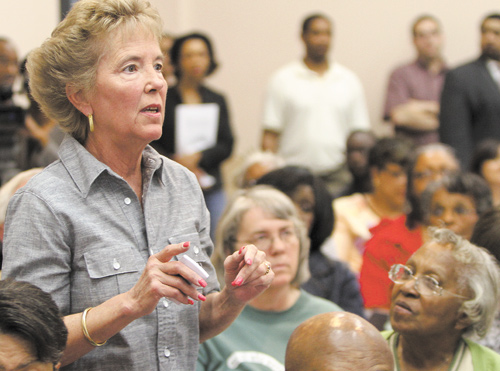Chatter over Youngstown charter

Maggy Lorenzi, asks a question at a meeting of the Youngstown charter-review committee to gauge public reaction to the 17 charter amendments its members are proposing to city council.
YOUNGSTOWN
At times, the crowd at the city charter-review committee’s public meeting was loud, impatient and more than willing to share opinions.
And that was after voting on whether they agreed or disagreed with only the first of 17 proposed charter amendments.
But the group of about 100 settled down for the most part at Tuesday’s public meeting at the Youngstown Historical Center of Industry and Labor.
“I guess we kind of expected that,” said Jerome Williams, the committee’s chairman. “But it was a good meeting.”
Before the discussion of the proposed amendments, Phil Kidd, a committee member who ran the meeting, said the group had made 17 recommendations it was going to for-ward to city council.
The objective of Tuesday’s meeting, he said, was to inform the public of those recommendations and gauge whether people agreed or disagreed with them and determine how important they are to citizens.
Each city resident at the meeting received a Turning Technologies keypad to vote on agreeing or disagreeing with the proposed amendments.
“Their concerns were valid, but this was not the forum for it,” Kidd said.
The committee previously had five meetings to get public input.
In an effort to calm the crowd, Nikki Posterli, a committee member, reminded the audience of the public meetings.
“These recommendations are your recommendations,” she said. “This information is not from the 11 of us [on the committee]. It’s from” feedback given by citizens at the other meetings.
Except for a combined proposal to eliminate term limits for the mayor and create the position of vice mayor, a job that would replace chief of staff/secretary to the mayor, most people voted to “strongly agree” rather than “strongly disagree” with all the other recommendations.
Among the committee’s key recommendations are to require council wards to be redistricted every decade after the U.S. Census, have nonpartisan elections, reduce the salary of council members, require council committee and general meetings to start no earlier than 6 p.m., make it easier to recall elected officeholders, eliminate an elected council president and have council choose that person among themselves, and have a charter-review committee every year.
The next step is to have the city law department determine if all recommendations comply with state or federal laws, and write the ballot language.
The charter requires city council to approve amendments before they’re put on the ballot for a public vote. Those approved by voters become part of the city charter.
Five council members attended Tuesday’s meeting, and some have concerns about some of the proposals.
Councilman Mike Ray, D-4th, said he doesn’t believe it is appropriate for a charter amendment on when council can meet as there are long-standing council rules on the issue.
“You can’t legislate everything” through charter amendments, he said.
 43
43
